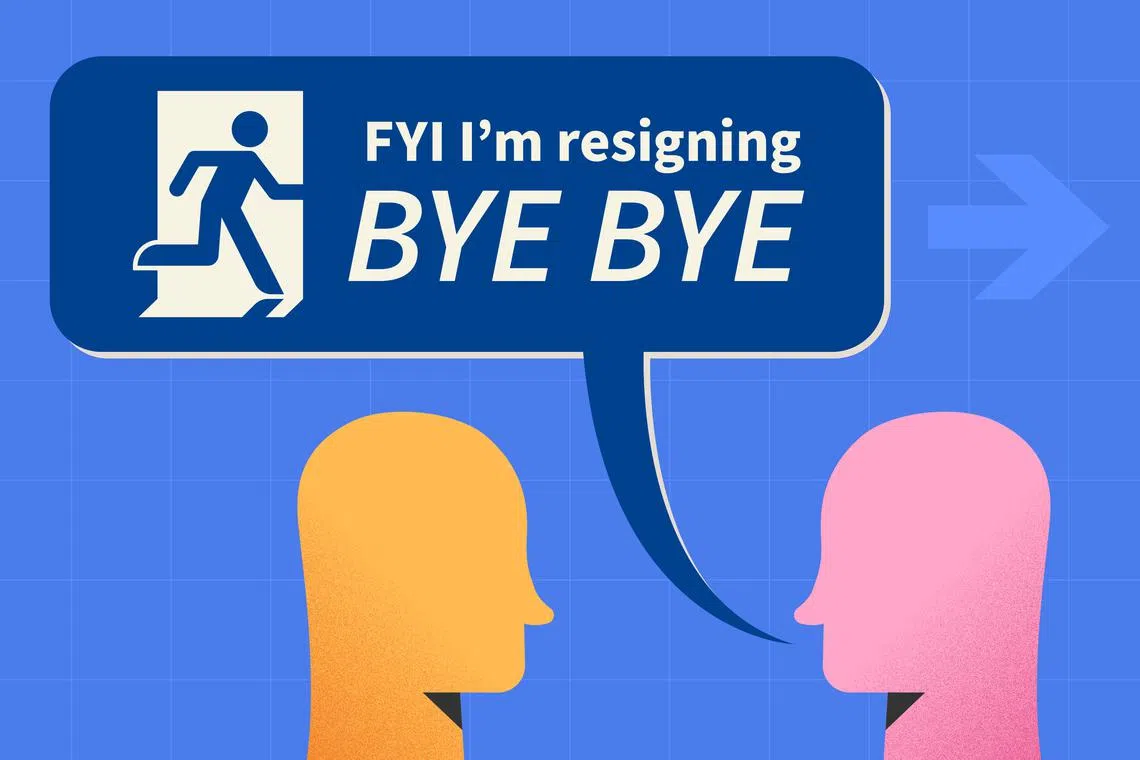askST Jobs: Should I inform my boss earlier of my plans to resign, before I tender my resignation?
Sign up now: Get ST's newsletters delivered to your inbox

Forewarning is often not needed, but can aid transition planning and preserve ties.
ST ILLUSTRATION: LEE YU HUI
Follow topic:
SINGAPORE - In this series, manpower correspondent Tay Hong Yi offers practical answers to candid questions on navigating workplace challenges and getting ahead in your career. Get more tips by signing up for The Straits Times’ Headstart newsletter.
Q: Should I inform my boss earlier of my plans to resign, before I formally tender my resignation?
A: This is a common question that recruiters frequently encounter in helping job seekers navigate career transitions, says Mr Nilay Khandelwal, senior managing director for Singapore and India at talent consultancy PageGroup.
“Generally speaking, it’s not mandatory and often not advisable to give a heads-up before you’re ready to tender your formal resignation.
“Until your plans are concrete, giving early notice can create uncertainty and unintended consequences.”
In making the choice, you will need to consider factors including the depth of your relationship with your manager, your workplace culture and your readiness to make the next move.
The benefits of giving an early indication before formally resigning centre on preserving relationships, enabling transition planning and maintaining your reputation, Mr Khandelwal notes.
“Your leader will appreciate the heads-up as they have time to plan for a smooth handover, which may make you more valuable in the exit process and beyond,” he says of transition planning.
Giving advance notice before formally tendering the resignation can showcase professionalism and emotional intelligence in perceiving potential knock-on effects for your team. According to Mr Khandelwal, this approach can be valuable in industries where reputations carry weight.
Conversely, risks include being excluded from key projects, conversations or growth opportunities in favour of other people who have not signalled their plans to leave.
Moreover, prematurely informing your higher-ups may put you in a vulnerable position, especially if you end up deciding to stay, as it can sour perceptions of how trustworthy you are, Mr Khandelwal says.
There may also be contractual implications too: “In some cases, early disclosure could lead to an immediate exit, depending on your employment terms or the employer’s discretion.”
As for the right time to inform your boss, he suggests doing so only after a firm job offer is secured and when you are ready to hand in your formal resignation, or a few weeks away from actually resigning.
“Don’t feel pressured to pre-announce your resignation unless it aligns with your best interests and the culture supports it.
“Your notice period exists for a reason, and it’s usually the appropriate time to make your intentions official.”
Mr Ken Ong, country manager for Singapore at recruitment firm Morgan McKinley, advises workers who are considering resigning to first have a private, informal chat with their leaders about the factors that have affected their job satisfaction, such as a lack of progression.
“Have a chat to tell them what are the push and pull factors (away from the job), and how these factors can be addressed.”
Such a conversation would subtly suggest that if these issues remain unresolved, you might start exploring new job opportunities, without giving the impression that you are dead set on leaving.
“Don’t say you want to leave in the same conversation,” Mr Ong says.
This is because, sometimes, organisations may be able to help solve the issues that were brought forward, if given a reasonable amount of time.
A more explicit announcement can wait.
Mr Ong says: “I usually encourage people to announce the resignation, or impending plans to resign, only when they have the employment contract for their next job on hand.”
On having early discussions, Mr Khandelwal says “a proactive discussion can reinforce mutual respect and trust, especially if you’ve had a long tenure or a close working relationship”.
He adds: “How you exit a company is just as important as how you join one, so handle it with tact, timing and professionalism.
“You might rejoin the company in future under the right circumstances. We are here to build long-term professional relationships.”
Have a question? Send it to askst@sph.com.sg


